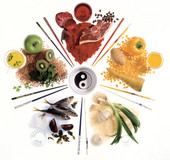|

Although we are all individuals, with our own specific nutritional needs that vary due to our unique external and internal stresses, we all belong to the same life form species called Homo Sapiens or mankind.
Our species has a common bodily process that requires certain nutrients to maintain life,
to grow, to develop (physically and mentally), to renew cells and to turn food into energy. The World Health Organisation has determined, for an "average" adult person, the essential nutrients needed and the safe quality you should intake each day. This work has been duplicated in Europe and the United States. As you would expect the results vary, but ever so slightly. The results are presented below.
Energy Sources or "Calories"
Carbohydrates 55 to 70 %
Fats 15 to 30 %
Cholesterol 10 to 300 mg
Protein 10 to 15 %
Sugar 0 to 5 %
Fiber 20 to 40 grams
Salt 2 to 6 grams
It is very clear from the above table that a variety of foods is the best way for our common processes to satisfy YOUR SPECIFIC nutritional needs. See also Nutritional Pyramid and Bad Meals that Damage the Nutritional Pyramid.
Having established the above, nutritional research then moved on to determine how to OPTIMIZE the benefits of the nutrients and energy sources. Here are some of the more significant findings.
The more you eat the better. Try reaching 70% of your daily caloric need and feel the effect. Complex carbohydrates are primarily starches, e.g. potatoes, pasta, etc. Your body prefers/needs these over the carbohydrates provided by sugars.
Getting the balance of carbohydrates correct (for a healthy person) is the key to establishing and maintaining the height-weight ratio. This means you are to limit sugar intake to less than 5% of your caloric need.
Often totally misunderstood. Fats are essential in the daily dieting of every healthy, balanced height-weight-muscle mass person.
The essential role of fats is in a cell structure. A prolonged absence of fat intake can result in breakdown or damage to the central nervous system and/or the immunity system.
For these systems you need the acids created from polyunsaturated fats. Our bodies can not synthesise these acids from any other substances. Vegetable fats are an excellent source of this vital nutrient if they have not been hydrogenated (many vegetables are to enhance their texture). We need to balance our fat intake. Given below is a Guideline.
The "Fat Success" Story - The Proportional Split of MUS, PLUS and SATs is Important
It is well known that only through eating proteins can the body receive the full range of "essential" amino acids. Our blood, immunity system, cell growth need protein.
For optimal digestion and benefit try to balance protein intake:
Vegetables + Lentils - 45%
Lean Animal Meat/Products - 55%
Over prolonged periods, a daily intake of excess protein can lead to fatigue, digestion problems, kidney sensitivities, and even liver problems. Therefore keep protein intake to 10-15% of Daily Calorific Need.
Essential to good digestion. Do not over-do or else, the fibre will remove vitamins. Water-soluble fibres in oatbran, beans and some fruit are capable of reducing cholesterol level.
Often misunderstood it is necessary for healthy bodily functions. It is necessary for cell and tissue growth/strength. Cholesterol is primarily synthesised in the liver. Therefore a lack of cholesterol in food can be compensated for, but an excessive intake cannot easily be broken down and eliminated by our bodily functions.
Essential to all our life functions, either directly or indirectly. They regulate metabolism and assist the biochemical processes that release the energy from digested food/drink.
Vitamins taken in excess will affect physical performance and mental alertness. Vitamin supplements should only be taken after you have perfected the balancing of arbohydrates, Fats, Proteins, and Sugars. Once this is "fine-tuned" to your body needs you may discover that supplements are not needed at all or are only needed periodically.
Herbs also contain many vitamins. Again, before taking vitamin supplements consider this if you are taking herbs. Vitamins work together. They also work with minerals. Some of the more common vitamins work in the following way.
Minerals function as coenzymes. They are needed for proper composition of body fluids, forming bones and blood, maintaining healthy nerve functions. Minerals entering your body compete with vitamins for absorption. It is essential to take them in balanced amounts.
|





